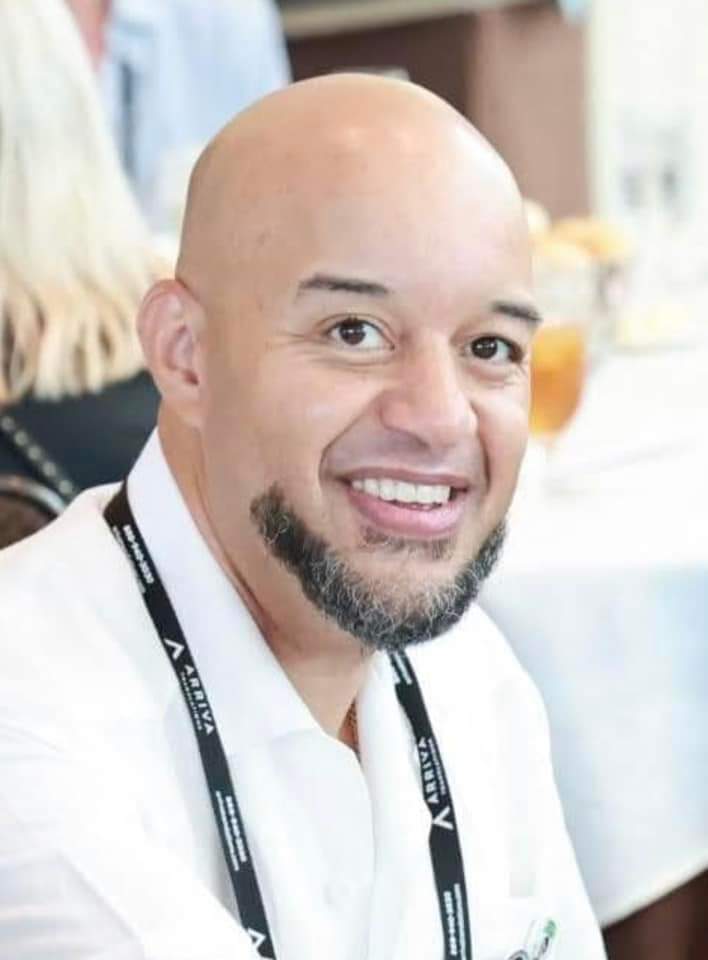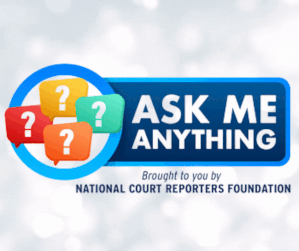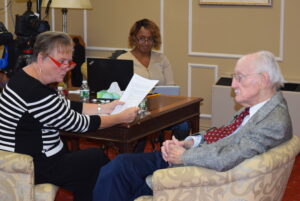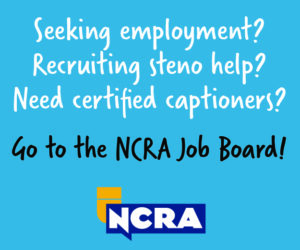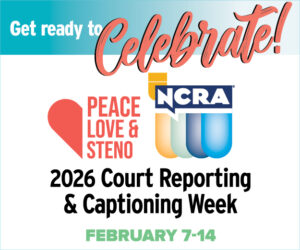By Jill Parker Landsman
In a record-breaking Ask Me Anything ZoomUp last week, the “How I Graduated” panel discussion engaged more than 50 attendees during the one-hour members-only session. Focusing on the challenges faced during their education, seasoned court reporters, including one instructor along with newly graduated student court reporters, provided tips about how to make it to the finish line and graduate from court reporting school with confidence.
NCRF Chair-Elect Meredith Bonn, RPR, CRR, chair of the AMA Task Force, moderated this ZoomUp intended to provide advice about “How to get over the hump; how to get court reporting school done. We want the key to the universe,” she said.
School was not a smooth sail for most panelists. Anjelica Brooks said, “It was a roller coaster. I took an entire semester off. What really clicked everything was changing up my practice. I found that slowing down and getting back to basics helped. When I slowed down, I was able to speed up … I changed my mindset.”
Finding the right program took Angie Podge, RSR, time and patience as she attended three court reporting programs. “Sometimes the school you start with is not necessarily the school that will get you there,” she said. “I had a silent study buddy on Zoom, and we did that [practiced together on Zoom] for accountability.” Regardless of which school she attended, she found one requirement to be “putting in the work on your own.”
A 26-year veteran court reporter and instructor for eight years, Allie Hall, RDR, CRR, CRI, credits having “ tenacity” as the secret for completion. “Just have faith that it’s all going to come together. I was a single mother. You have to be disciplined and dedicated.” Once, Matthew Moss, RPR, told Hall’s students that he had to take 1075 tests to pass 75 tests. Hall’s inherent message is to never give up and keep on trying.
One secret for success for Jillian Kirchner, RMR, CRR, was forging brand-new relationships in the court reporting space. She said, “I did SimplySteno for speedbuilding. I was at a plateau for about five months. I started to reach out to people in my state association; I started to shadow others. Practice groups helped me get there.”
Mindset is most important to master to accomplish higher speeds, according to Bethany Morse, RSR. She said, “It was about practicing fast to trick your brain. Believing in myself was one of the biggest things.”
Fortitude was how Denyce Sanders, RDR, CRR, succeeded as a student. “I had tenacity. I practiced. I was focused. I worked harder at it and got through school in one-and-one-half years.”
Taking care of her mental health was a guiding star for Chandler Alvino, RPR. “I was in a constant state of frustration. There was my body’s reaction to the frustration and my brain’s reaction to the frustration. I had testing anxiety. There were baby steps, but I would get there. I would walk my dog, Cooper. It’s knowing when to step away from the steno machine, go on the beach, talk to my friends.”
Hall said that “not all tests are equal. When you are frustrated, do something you enjoy. Do an episode of Netflix. Take a moment and do something else.”
Managing practice frustration was a major headwind for Kirchner. She said, “When I failed a test, I would say ‘Okay, next test. Let’s go.’ And then I would test and pass. Minimize the frustration.”
Brand-new graduate Brooks admitted that time management and organization were not her best suits. “ I just started writing everything down. I have my To-Do list. I gave myself a plan. There are 2 million words in the English language. Having a direction to go in really helped me,” she said.
“I don’t think I could have finished if it weren’t for my mentors and best friends,” said Podge. “So when things are tough, it is great to have someone to understand what’s happening. If it weren’t for those people, I would not have finished.”
Training to compete in NCRA speed contests motivated Rich Germosen, FAPR, RDR, CRR, to create a practice process that would help him achieve his goals. His colleagues wanted the same. He said, “You need a place to report. The (FB) practice page started ten years ago.”
New reporter Annie Mueller said, “I would practice during my lunch break. I would practice 60 to 90 minutes a day. I would start easy and end easy. I would still write to music or something that would make me happy.”
Suggested Skillbuilding Strategies and Tips
- Students should practice consistently, carving out blocks of time each day for concentrated practice.
- Take advantage of NCRA’s Virtual Mentor Program. Seek mentors through state court reporter associations. Seek mentors through courts or freelance firms.
- Explore various methods for managing nerves such as positive affirmations, prescribed medicines, hypnosis, stepping away to do an enjoyable activity to recharge and then restart.
- Students can join stenographer communities for support and advice. Facebook has practice pages for accountability.
- Students should create a structured practice plan, preferably written, and learn to manage time effectively to build skills.
- Students should focus on building confidence through targeted practice sessions at comfortable speeds. Learn the basics.
- Three hours per day of practice on top of coursework seems to be the magic number for many to succeed.
Since practice makes perfect, readers can transcribe the full video of this AMA ZoomUp: How I Graduated.
The next NCRF Ask Me Anything ZoomUp is scheduled for Tues., Dec. 3, with panelists discussing best practices for “Fiscal Responsibility.” Register now.
Jill Parker Landsman is the NCRF Manager. She can be reached at jlandsman@ncra.org.



